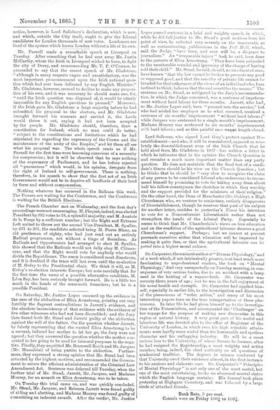Mr. Parnell made a remarkable speech at Liverpool on Tuesday.
After remarking that he had sent away Mr. Justin McCarthy, whom the Irish in Liverpool wished to have, to fight the city of Derry, and recommending Mr. T. P. O'Connor, he proceeded to say that the recent speech of Mr. Gladstone, " although in many respects vague and unsatisfactory, was the most important pronouncement upon the Irish national ques- tion which had ever been delivered by any English Minister." Mr. Gladstone, however, seemed to decline to make any proposi- tion of his own, and it was necessary he should make one, for, "until the Irish question was disposed of, it would be utterly impossible for any English questions to proceed." Moreover, if the Irish gave Mr. Gladstone a large majority before he had submitted his proposal to the electors, and Mr. Gladstone brought forward his measure and carried it, the Lords would throw it out, saying it had not been accepted by the people. Mr. Gladstone should, therefore, draw a constitution for Ireland, which no man could do better, 4‘ subject to the constitutions and limitations which he had stipulated for regarding the supremacy of the Crown and the maintenance of the unity of the Empire," and let them all see what his proposal was. The whole speech reads as if Mr. Parnell for the first time were becoming conscious of a necessity for compromise; but it will be observed that he says nothing of the supremacy of Parliament, and be has before rejected all "guarantees" which would, in his opinion, derogate from the right of Ireland to self-government. There is nothing, therefore, in his speech to show that the first act of an Irish Government would not be to deprive all landlords of their land by force and without compensation.






































 Previous page
Previous page